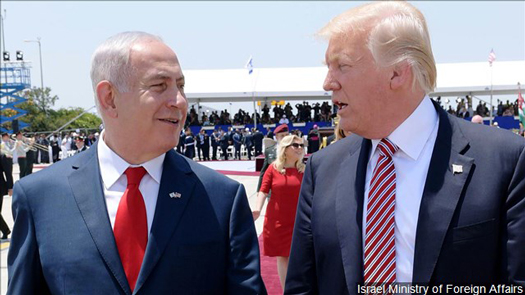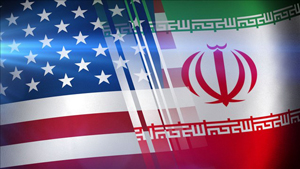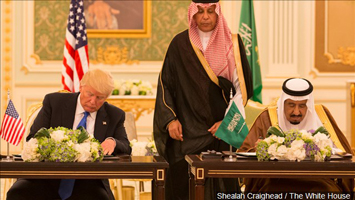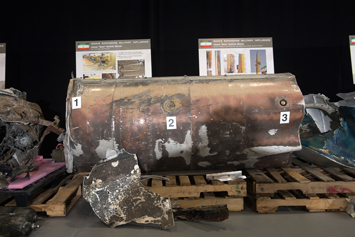Saudi Arabia, Israel, the U.S., Iran and Middle East tension
By Brian E. Muhammad -Staff Writer- | Last updated: Dec 19, 2017 - 11:03:14 AMWhat's your opinion on this article?

President Trump with Israel Prime minister, Benjamin Netanyahu in May.
|
United States Middle East policy is proving more polarizing than unifying and pushing the world toward conflict say observers. Standing before the press at the Anacostia-Bolling military base in Washington D.C., Nikki Haley, U.S. ambassador to the United Nations, presented fragments of what the Department of Defense described as Iranian Qiam missles.
One was fired at the King Khaled International Airport in Riyadh, Saudi Arabia, allegedly by Yemeni Houthi fighters in early November which the royal kingdom said was an “act of war” by Iran.

|
But, the accusations and appeal Dec. 14 came amid growing rejection of America by world nations over President Donald Trump’s official recognition of Jerusalem as the capital of Israel which sparked days of outrage and protests in the region.
The main allies working against Iran have been Saudi Arabia, in competition for regional power, the United States and Israel. The Saudis until recently held any alliance involving Israel at a low key level, said observers.
“The Israelis and the United States have regularly referred to an alliance against Iran—that includes Israel, the United States and Saudi Arabia,” said Bill Fletcher, racial justice and international human rights activist.
Israel has been angling for all out war in the Middle East along with America and primarily Saudi Arabia with a focus on Iran. There is talk of strengthening a “moderate Sunni axis” that includes Saudi Arabia and other gulf nations with the U.S., and Israel to combat Iran.

President Donald Trump and King Salman bin Abdulaziz Al Saud of Saudi Arabia sign a Joint Strategic Vision Statement for the United States and the Kingdom of Saudi Arabia, at the Royal Court Palace in Riyadh, Saudi Arabia, May 20.
|
With new leadership under Saudi Crown Prince Mohammad bin Salman and sweeping domestic changes in the kingdom, it’s a different day for Saudi relations in the region. Her critics reject strengthening any ties with Israel.
The international Boycott, Divestment, and Sanctions (BDS) campaign calls on countries in the region to not normalize relations with Israel because of mistreatment of the Palestinian people.
“One of the main reasons that Israel can violate international law and commit crimes against Palestinians is because governments fail to meet their legal obligations to hold it to account and provide Israel with political and material support,” said bdsmovement.net.
Sanctions were the final blow to the apartheid regime in South Africa and the BDS movement calls for sanctions against Israel.
The BDS also calls for governments to meet their legal obligations not to be complicit in Israeli crimes and not to provide aid or assistance that allows Israel to maintain its system of settler colonialism and apartheid.
Analysts are saying an accumulation of events stemming from American and Israeli policies are laying out pretexts for an eventual war with Iran.
The Trump administration asserts the war material displayed Dec. 14 is hard evidence that Iran is a destabilizing factor in the region and has violated UN Resolution 2216 against supplying, selling or transferring certain weapons unless permitted by the world body. According to Ms. Haley, the missile was provided by Saudi Arabia.
“It’s hard to find a conflict or a terrorist group in the Middle East that does not have Iran’s fingerprints all over it,” Ms. Haley said.
She told the reporters Iranian ballistic missiles and advanced weapons are turning up in warzones across the region. Iran refuted the claims as false and decried further fanning of regional hostility by America.

Nikki Haley, U.S. ambassador to the United Nations, presented fragments of what the Department of Defense described as Iranian Qiam missiles. Photo: Department of Defense/by EJ Hersom
|
With global pushback against President Trump’s Jerusalem declaration, some nations like Saudi Arabia and Bahrain are left in awkward positions. They are opposite most in the Muslim world and broader world community. But Saudi Arabia is a major purchaser of arms from the American military industry. They are partners in waging war in Yemen, a conflict which has killed 10,000 people since 2012.
Meanwhile, alliances intensified with President Trump’s Jerusalem decision. The 57-member Organization of Islamic Cooperation announced it would recognize “East Jerusalem as the capital of the State of Palestine and invite all countries to recognize the State of Palestine and East Jerusalem as its occupied capital.”
The OIC issued the communique at the end of a Dec. 13 emergency summit in Istanbul, Turkey.
In recent weeks Israel has spoken of closer ties with Saudi Arabia. The Elaph, a Saudi newspaper, interviewed Israel Defense Forces Chief of Staff Gadi Eizenkot, who spoke of isolating Iran and Israeli commitment to what he called Mr. Trump’s “moderate Sunni axis” cooperation.
“The greatest actual danger in the region is Iran,” Mr. Eizenkot said. Calling Tehran “a menace,” he named the nuclear issue, support of Hezbollah and Islamic Jihad and the Houthi fighters as problematic areas.
When Elaph asked if Israel will share intelligence with the kingdom, Mr. Eizenkot answered: “We are ready to share information if necessary. There are many common interests between us.” Later, in a Dec. 15 Israeli Haaretz article, he is quoted as saying Iran is not the main threat, but Hezbollah and Hamas are.
INSIDE STORIES AND REVIEWS
-
-
About Harriett ... and the Negro Hollywood Road Show
By Rabiah Muhammad, Guest Columnist » Full Story -
Skepticism greets Jay-Z, NFL talk of inspiring change
By Bryan 18X Crawford and Richard B. Muhammad The Final Call Newspaper @TheFinalCall » Full Story -
The painful problem of Black girls and suicide
By Charlene Muhammad -National Correspondent- » Full Story -
Exploitation of Innocence - Report: Perceptions, policies hurting Black girls
By Charlene Muhammad -National Correspondent- » Full Story -
Big Ballin: Big ideas fuel a father’s Big Baller Brand and brash business sense
By Bryan Crawford -Contributing Writer- » Full Story






 Click Here Stay Connected!
Click Here Stay Connected!








